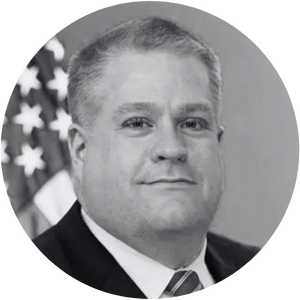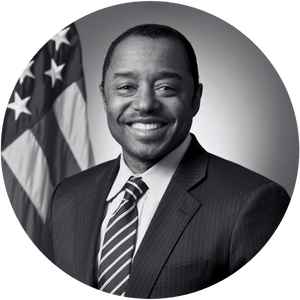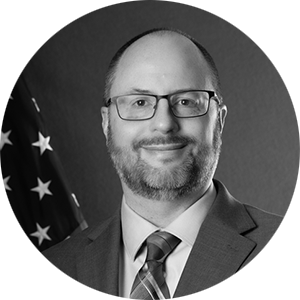Agenda
February 26, 2026
Times are subject to change.
Pick up your badge, grab some breakfast and network with your peers!
Pick up your badge, grab some breakfast and network with your peers!
Welcome to our Cybersecurity Futures: Built on Zero Trust!
Welcome to our Cybersecurity Futures: Built on Zero Trust!
Zero Trust is more than a compliance mandate—it is a proactive framework to enhance federal cybersecurity and resilience. This session focuses on advanced strategies for adopting Zero Trust principles while addressing the unique challenges posed by legacy systems. Discussions will explore leveraging modern tools, enhancing data protection, and integrating Zero Trust into existing infrastructures without disrupting mission-critical operations. Leaders will share practical approaches for prioritizing upgrades, implementing secure workarounds, and fostering a culture of adaptive security that evolves with emerging threats.
Zero Trust is more than a compliance mandate—it is a proactive framework to enhance federal cybersecurity and resilience. This session focuses on advanced strategies for adopting Zero Trust principles while addressing the unique challenges posed by legacy systems. Discussions will explore leveraging modern tools, enhancing data protection, and integrating Zero Trust into existing infrastructures without disrupting mission-critical operations. Leaders will share practical approaches for prioritizing upgrades, implementing secure workarounds, and fostering a culture of adaptive security that evolves with emerging threats.

Daniel Buchholz
Red Cell Section ChiefU.S. Department of State

Dave Raley
Chief Digital Business OfficerU.S. Marine Corps Community Business

Mike Colson
Director, Public Sector GrowthAkamai

Usman Chaudhary
Strategic Growth ExecutiveGoogle Public Sector
Cybersecurity is becoming a defining factor in federal contracting. What was once an IT consideration is now a core element of procurement strategy, with agencies increasingly embedding security requirements into RFPs and contract clauses. Frameworks like NIST SP 800-171 and DFARS are shaping how vendors compete, how teams are structured, and how risk is managed across the supply chain. For contractors, especially those in the Defense Industrial Base, this shift is changing the game. Compliance is no longer optional. It is a prerequisite for eligibility, partnership, and long-term viability. This session will bring together acquisition officials, cybersecurity leaders, and industry experts to explore how evolving security mandates are shaping the defense contracting environment. Speakers will discuss how requirements are being communicated in RFPs, how compliance is being evaluated, and what this means for innovation, competition, and small business participation.
Cybersecurity is becoming a defining factor in federal contracting. What was once an IT consideration is now a core element of procurement strategy, with agencies increasingly embedding security requirements into RFPs and contract clauses. Frameworks like NIST SP 800-171 and DFARS are shaping how vendors compete, how teams are structured, and how risk is managed across the supply chain. For contractors, especially those in the Defense Industrial Base, this shift is changing the game. Compliance is no longer optional. It is a prerequisite for eligibility, partnership, and long-term viability. This session will bring together acquisition officials, cybersecurity leaders, and industry experts to explore how evolving security mandates are shaping the defense contracting environment. Speakers will discuss how requirements are being communicated in RFPs, how compliance is being evaluated, and what this means for innovation, competition, and small business participation.

Derrick Davis
Senior Fellow, AI For Developing Countries Forum, Center for Research in Emergent Manufacturing (CREM)University of Maryland, Baltimore County

Terry Kalka
Deputy Director, DoD Cyber Crime Center (DC3)/DIB Collaborative Information Sharing Environment (DCISE)Department of Defense

Nick Wakeman
Editor-in-chiefWashington Technology
The rise of cyber-attacks indicates the obvious—the current approach to security isn’t working. Enter Zero Trust. There is not a single blueprint for implementing zero trust. EO 14028, NSM 8, and the National Cybersecurity Strategy require agencies to implement zero trust. And, DoD, CISA, NIST and OMB have all issued architecture guidance. This often
results in agencies implementing a self-defined approach made up of an assortment of single-purpose solutions. An ad-hoc approach has limitations and is not scalable, often making an environment more susceptible to security gaps and vulnerabilities.
Attend this session to learn about the best practices for implementing zero trust. The speaker will discuss the top 5 tips for putting zero trust into action.
The rise of cyber-attacks indicates the obvious—the current approach to security isn’t working. Enter Zero Trust. There is not a single blueprint for implementing zero trust. EO 14028, NSM 8, and the National Cybersecurity Strategy require agencies to implement zero trust. And, DoD, CISA, NIST and OMB have all issued architecture guidance. This often
results in agencies implementing a self-defined approach made up of an assortment of single-purpose solutions. An ad-hoc approach has limitations and is not scalable, often making an environment more susceptible to security gaps and vulnerabilities.

Gina Scinta
Deputy Chief Technology OfficerThales TCT
Drawing on lessons from recent U.S. Air Force initiatives, this session will highlight key practices for piloting Zero Trust in operational technology environments. Attendees will learn three critical “do’s” that drive success, along with three common pitfalls to avoid, based on real-world pilot experiences. The discussion will provide practical takeaways for federal teams navigating the complexity of securing OT systems under a Zero Trust framework.
Drawing on lessons from recent U.S. Air Force initiatives, this session will highlight key practices for piloting Zero Trust in operational technology environments. Attendees will learn three critical “do’s” that drive success, along with three common pitfalls to avoid, based on real-world pilot experiences. The discussion will provide practical takeaways for federal teams navigating the complexity of securing OT systems under a Zero Trust framework.
The Federal Zero Trust Strategy provides a blueprint for strengthening cybersecurity across agencies, emphasizing implementation and continuous improvement. This session explores practical approaches to adopting Zero Trust Architecture aligned with current Executive Orders focusing on challenges such as identity management, secure access, and legacy system integration. Leaders will also discuss methods for developing and applying key performance indicators to measure Zero Trust effectiveness, track compliance, and identify areas for improvement.
The Federal Zero Trust Strategy provides a blueprint for strengthening cybersecurity across agencies, emphasizing implementation and continuous improvement. This session explores practical approaches to adopting Zero Trust Architecture aligned with current Executive Orders focusing on challenges such as identity management, secure access, and legacy system integration. Leaders will also discuss methods for developing and applying key performance indicators to measure Zero Trust effectiveness, track compliance, and identify areas for improvement.
Read More
Frank Indiviglio
Chief Technology OfficerNational Oceanic and Atmospheric Administration
The rapid advance of artificial intelligence, automation, and synthetic media is transforming both the opportunities and risks in federal cybersecurity. In fiscal year 2024, federal civilian agencies reported more than 32,000 cybersecurity incidents to CISA, with a growing share linked to AI-enabled phishing, deepfake-based social engineering, and malware capable of adapting its behavior in real time. Automation is helping agencies cut average incident response times from initial detection to containment by as much as 40 percent, yet it also gives attackers the ability to scale intrusions and exploit vulnerabilities faster than human teams can react. This session will bring together cybersecurity leaders to examine how emerging technologies are reshaping agency defenses, where AI and automation are making the greatest operational impact, and how the convergence of advanced tools and cyber strategies is redefining resilience across the federal enterprise.
The rapid advance of artificial intelligence, automation, and synthetic media is transforming both the opportunities and risks in federal cybersecurity. In fiscal year 2024, federal civilian agencies reported more than 32,000 cybersecurity incidents to CISA, with a growing share linked to AI-enabled phishing, deepfake-based social engineering, and malware capable of adapting its behavior in real time. Automation is helping agencies cut average incident response times from initial detection to containment by as much as 40 percent, yet it also gives attackers the ability to scale intrusions and exploit vulnerabilities faster than human teams can react. This session will bring together cybersecurity leaders to examine how emerging technologies are reshaping agency defenses, where AI and automation are making the greatest operational impact, and how the convergence of advanced tools and cyber strategies is redefining resilience across the federal enterprise.

Dr. William Streilein
Former Principal Staff, MIT Lincoln Laboratory | Inaugural CTO of the Chief Digital and AI OfficeDOD

